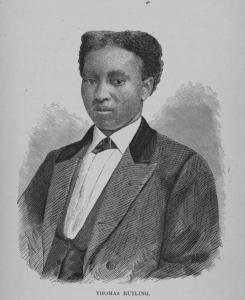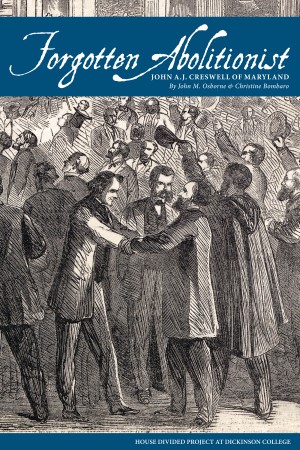
Thomas Rutling
(By Cory Palmer, Dickinson College, Class of 2012)
Thomas Rutling was born a slave in 1854 in Wilson County, Tennessee. He was the youngest of nine children, whose father either ran away or was sold before he was born. His mother ran away so much that she was sold her when Rutling was just three years old: “The very earliest thing I remember was the selling of my mother.” He recalled them whipping her at the slave market for trying to take him with her.
At eight years old he was used as the dining room waiter in his master’s house. Being so close to his master and other slave holders, Thomas heard a great deal about the war:
“About this time the old slaves told me that something was going on, and I must listen sharp up at the house and come and tell them what the white folks said…. I was a table waiter then, and after talking over the news at table, missus would say, “Now, Tom, you mustn’t repeat a word of this.” I would look mighty obedient –but– well– in less than half an hour, some way, every slave on the plantation would know what had been said up at massa’s house.”
Soon Thomas also heard about the Emancipation Proclamation in 1863 although he was not truly “freed” until 1865. In his 1872 interview with Gustavus D. Pike, Rutling recalls his freedom moments:
“One night the report of Lincoln’s Proclamation came. Now, master had a son who was a young doctor. I always thought him the best man going: he used to give me money and didn’t believe much in slavery. Next morning I was sitting over in the slave quarters, waiting for breakfast, when the young doctor came along and spoke to my brother and sister, at the front door. I supposed it was about work; but they jumped up and down, and shouted, and sang, and then told me I was free. I thought that was very nice; for I supposed I should have everything like the doctor, and decided in a moment what kind of a horse I would ride. We remained on the plantation until 1865.”
Once they left the Tennessee plantation, Rutling went with his brother and sister to Nashville to try and find their oldest sister and live with her. It was here that Rutling eventually enrolled in the Fisk Free Colored School. There he discovered that he had a talent for singing and joined the Fisk Jubilee Singers in 1872.

Thomas Rutling and the original Fisk Jubilee Singers
Interview with Gustavus D. Pike can be found in:
Blassingame, John W. Slave Testimony:Two Centuries of Letters, Speeches, Interviews, and Autobiographies. Baton Rouge: Louisiana State University Press, 1977, p.615-618.
Further Reading:
Ward, Andrew. Dark Midnight When I Rise: The Story of the Jubilee Singers Who Introduced the World to the Music of Black America. New York: Farrar, Straus, and Giroux, 2000.


I am a direct desendent of Mr Rutling and a legacy of Fisk University. Thomas was an extraordinary person
My slave family originated out of Wilson County, TN also. They were slaves of Colonel John Allcorn, who died in 1828. His wife Prudence was then the owner of them along with her son James Allcorn. I have tried numerous times to locate addition information on my Allcorn (Alcorn) family, but I have come to a standstill. My family hailed from Lebanon, TN, which is in Wilson County. What was the name of the township Rutling came from?